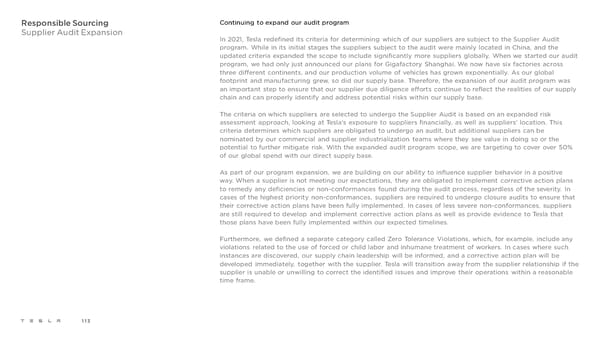Responsible Sourcing Continuing to expand our audit program Supplier Audit Expansion In 2021, Tesla redefined its criteria for determining which of our suppliers are subject to the Supplier Audit program. While in its initial stages the suppliers subject to the audit were mainly located in China, and the updated criteria expanded the scope to include significantly more suppliers globally. When we started our audit program, we had only just announced our plans for Gigafactory Shanghai. We now have six factories across three different continents, and our production volume of vehicles has grown exponentially. As our global footprint and manufacturing grew, so did our supply base. Therefore, the expansion of our audit program was an important step to ensure that our supplier due diligence efforts continue to reflect the realities of our supply chain and can properly identify and address potential risks within our supply base. The criteria on which suppliers are selected to undergo the Supplier Audit is based on an expanded risk assessment approach, looking at Tesla’s exposure to suppliers financially, as well as suppliers’ location. This criteria determines which suppliers are obligated to undergo an audit, but additional suppliers can be nominated by our commercial and supplier industrialization teams where they see value in doing so or the potential to further mitigate risk. With the expanded audit program scope, we are targeting to cover over 50% of our global spend with our direct supply base. As part of our program expansion, we are building on our ability to influence supplier behavior in a positive way. When a supplier is not meeting our expectations, they are obligated to implement corrective action plans to remedy any deficiencies or non-conformances found during the audit process, regardless of the severity. In cases of the highest priority non-conformances, suppliers are required to undergo closure audits to ensure that their corrective action plans have been fully implemented. In cases of less severe non-conformances, suppliers are still required to develop and implement corrective action plans as well as provide evidence to Tesla that those plans have been fully implemented within our expected timelines. Furthermore, we defined a separate category called Zero Tolerance Violations, which, for example, include any violations related to the use of forced or child labor and inhumane treatment of workers. In cases where such instances are discovered, our supply chain leadership will be informed, and a corrective action plan will be developed immediately, together with the supplier. Tesla will transition away from the supplier relationship if the supplier is unable or unwilling to correct the identified issues and improve their operations within a reasonable time frame. 113
 Tesla 2021 Impact Report Page 112 Page 114
Tesla 2021 Impact Report Page 112 Page 114